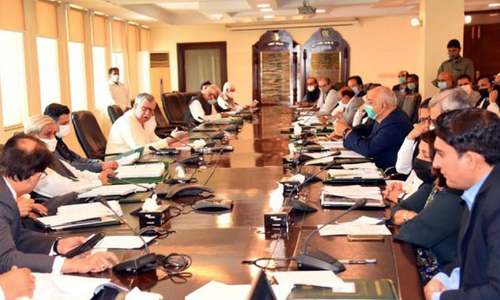ISLAMABAD: Ahead of upcoming talks with the International Monetary Fund (IMF), the Economic Coordination Committee (ECC) of the cabinet on Thursday approved a reduced Kamyab Pakistan Programme (KPP).
Presided over by Finance Minister Shaukat Tarin, the ECC meeting also approved payment of Rs131 billion to 11 independent power producers (IPPs).
It also okayed Rs5bn as internal security duty allowance for personnel of Pakistan Army deputed on western borders and payment of salaries to remaining employees of the Pakistan Steel Mills (PSM) for a few months.
The finance ministry said the ECC gave approval to the KPP on the basis of an updated summary. It said the programme had been streamlined in consultation with stakeholders to disburse microcredit for uplifting marginalised segments of society. The KPP has Kamyab Karobar, Kamyab Kissan, Naya Pakistan low-cost Housing, Kamyab Hunarmand and Sehatmand Pakistan components.
Payment of Rs131bn to 11 IPPs also gets the nod
Under the Kamyab Karobar, Kissan and Naya Pakistan low cost housing, micro-loans shall be disbursed amongst eligible persons registered with Ehsaas Data through National Socio-Economic Registry (NSER) who have family income of up to Rs50,000 per month. The Kamyab Hunarmand and Sehatmand Pakistan programmes will be integrated with the existing programmes. The KPP is aimed to integrate with government’s ongoing skill development programme for imparting educational and vocational training.
As per revised framework of KPP, selection of Wholesale Lenders (Banks) will be through competitive bidding in line with Public Procurement Regulatory Authority (PPRA) rules. The Micro Finance Providers (MFPs) will be selected by the wholesale lenders. The government will provide two guarantees including 10 per cent first loss guarantee to MFPs and 50pc guarantee to Wholesale Lenders (WLs) on pari-passu/risk-sharing basis.
During the first phase, the KPP will be launched in Balochistan, Khyber Pakhtunkhwa, Gilgit-Baltistan, Azad Jammu and Kashmir and a few poorest districts of Sindh and Punjab. The KPP will be extended to whole Pakistan eventually. On the implementation side, the Kamyab Pakistan Information System (KPIS), a digital portal, is being established which is fully integrated with telecommunication companies, National Telecom Communication (NTC), Ehsaas/NSER and Nadra for verification of beneficiary’s eligibility.
The ECC approved the KPP for submission to the cabinet for formal approval before its launch. The finance minister had said a few days ago that the KPP would be launched within this year with trimmed down size to ultimately to support 4-6m households as the IMF had agreed to the revised KPP size and structure. According to Mr Tarin, size of the programme for first year had been reduced to about Rs156bn from originally envisaged Rs315bn while the chunk of subsidy had also been reduced from Rs21bn to about Rs10-12bn.
The programme would be operated through the KPP Portal called KPIS. There will be a toll-free number which will be integrating the KPIS through Telecos via NTC. The portal will be integrated with Ehsaas Data and Nadra for verification of beneficiaries eligibility to facilitate the Executing Agencies (Microfinance Providers) for finalising the financing modalities in an efficient and seamless manner.
The ECC also approved a request of the power division for payment of 40pc (first installment) of the total amount payable to IPPs of 2002 policy. The Cabinet Committee on Energy had cleared on September 13 the payment of about Rs131bn to 11 IPPs (barring Nishat Chunian).
The payment of dues to 12 IPPs set up under the 2002 policy had become controversial after the National Accountability Bureau (NAB) took cognizance of the issue and all government forums and ministries abstained from taking responsibility to clear outstanding amounts agreed upon after a lengthy process of negotiations and settlements. It was put on record that excess gain of over Rs8.36bn allegedly stood proven against Nishat Chunian set up under the 2002 policy. Other 11 projects of the same policy also came under similar suspicion.
As a result, the payments to almost all the IPPs (pre-1994, 1994 and 2006 policies) as 40pc first installment were made except 12 IPPs of the 2002 policy. All these projects agreed to have local arbitration proceedings but controversies did not allow formal signing of arbitration agreements.
Published in Dawn, September 24th, 2021














































